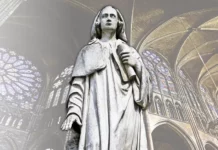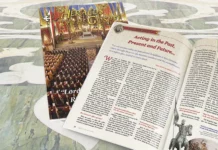We should be conscious of the vital need for true justice, which accords to each one what belongs to him and which, through faith, we know is given by God.
“Only when you are the victim of an injustice will you truly and fully understand what justice is! Beyond all the definitions and explanations given to us in this regard by Cicero and Ulpiano, only when we feel that we are the victim of an injustice do we begin to understand the importance, or rather the indispensable need, for justice in human relations, whether in the civil or ecclesiastical sphere. For every time we suffer an injustice, it is as if something vital has been torn from us.”
In my twenty-four years of teaching, I have always made the above introduction in the Philosophy of Law course, when approaching the theme of justice, in its relations with rights and the law, trying to contextualize the whole within the enigma that is human freedom and attempting to make students aware that, in the end, the only way to be truly free is to follow certain rules. And by demonstrating that the problem is not whether there are rules or not, but exclusively whether they are just rules, because man, called by nature to live with others, cannot fully understand how much this is an integral part of himself.
Paradoxically, even in a utopian anarchic society in which the principle of total absence of rules and laws is affirmed, everyone would nevertheless be subject to a rule!
Clamorous injustices

Therefore, it is not a matter of formulas and definitions, of abstract principles unheard-of in daily life, but, concretely, of having as an invariable objective that “golden rule” that Christ left us: “Whatever you wish that men would do to you, do so to them; for this is the Law and the prophets” (Mt 7:12).
All this flooded back to my mind again when I read in the newspapers or saw on the television the news concerning the fate, among so many others less well known, of the student Patrick Zaki, who has been in “preventative detention” – and someone in recent years has also spoken of “preventative war”, with the consequences we all know… – for more than a year in Egypt, for “presumed subversive activity,” no doubt through the literal application of the extant legislation; news about the imprisonment – shameless and verging on the ridiculous, that in reality is only a “seizure of power”, for “possession of four illegally imported walkie-talkies” – of Aung San Suu Kyi, the legitimate head of the Burmese government, carried out by the armed forces, who took power for a year, imposing martial law; finally, news of the sentence of two years and five months’ detention inflicted on Russian dissident Alexei Navalny, who survived an assassination attempt by poisoning. The court sentence was handed down as part of the 2014 Yves Rocher case, for which the dissident had been found guilty of misappropriation. Navalny protested loudly in court: “I ask for immediate release for myself and all political prisoners. These theatrics are illegal.”
These are the recent and clamorous cases. But how many patent injustices are committed all the time in families, in workplaces, in the context of religious denominations and in the world of sport? Often and willingly, all this happens even with the justification and complicity of a “law”, just as over the course of centuries – thanks to a “law” – people have been burned, ethnic groups have been slaughtered and exterminated, no one knows how many human beings have been confined in concentration camps, groups of people have been ghettoized and their property confiscated. In this respect, Erich Kaufmann’s statement sounds an unforgettable warning: “The state does not create law, the state creates laws, and the state and the laws are subject to the law” – see the post scriptum at the end of these reflections.
To be authentic, human law must agree with Divine Law

Common sense makes us recognize today – but such was not the case for those who lived through all of this, of course… Therefore, this could happen to us also! – that these so-called “laws” were not and could not be true; they only had the appearance of laws, but they were not, for the simple reason that they lacked justice.
The great St. Thomas Aquinas1 corroborates this sad truth with utmost clarity, pointing out that they are not true laws, but only their corruption, which inevitably takes place when human law loses its relationship with Divine Law.
The saddest thing is that, in fact, most of the times these laws are “formally” true in a certain society, even when imposed in a dictatorial way or voted for in a democratic parliament, thus demonstrating the human and fragile side of democracy, which is based on consensus, on the majority of votes. It turns out that consensus is not synonymous with justice; it is as relevant to justice as the fact that two and two are four: simply irrelevant!
Of course, this does not imply calling the democratic form of government into question, but merely being aware of its intrinsic limitations, as Benjamin Franklin, one of the fathers of the US constitution, rightly observed: “Democracy is two wolves and a lamb voting on what to have for lunch; liberty is a well-armed lamb contesting that vote.”
The law should serve the common good and never opportunism
However, in addition to the question of laws that usurp and destroy in a manifest way, corrupting their function and meaning, there are cases – in my view, unfortunately the majority – of the arbitrary use and application of laws that in themselves are objectively just and useful for the achievement of coexistence for the common good, on the part of those who exercise authority, which in reality ends up being nothing but authoritarianism and the mere exercise of power.
Those who should be guarantors of the law only show themselves to be opportunists who use, in favour of their personal interests or of the group to which they belong, that which has been established for the common good; persuaded that their position allows them to feel like the Roman emperors who – although at first only in some areas of private law – thought themselves neither subject to nor bound by the law. 2
These are people called upon to “serve” their own institution and who instead take advantage of or adulterate it, not applying the rules fairly, convinced that they are accountable to no one – only on this earth, we hope! – and, in any case, will remain unpunished as long as they exercise authority and have power.
Thus the words attributed to the President of the Council of Ministers in the Kingdom of Italy, Giovanni Giolitti, come back to mind, although they may sound very cynical: “What is the law? It is that which one applies to enemies and interprets for friends.”
However, this way of distorting the quest for justice appears in a disturbing, I would almost say scandalous way, in the judicial sphere. It is precisely in this area, in all contexts, that one can see how the judiciary is not so independent, and how justice is not only no longer blindfolded, but keeps its ears open to gather opinions from the media, from sentences that are perhaps broadcast on a talk show. The accused is not given a true right of defence – something that God himself did with Adam (cf. Gn 3:9-13) – when the identity of the accuser is kept hidden or his credibility is not investigated, constitutive elements of the juridical civilization of which we are children. On the basis of juridical sophistry, the most elementary rules of the administration of justice are not respected when it is convenient and for whom it is convenient. Relegated to oblivion is the simple truth – but, like all truths, one of adamantine inviolability – that judges are needed to administer justice and not to seek to create it, feeling almost like gods.
To respect justice is the best way to love

In the light of these simple considerations based on history and the present time, which are not and should not be understood as a judgement, we should be mindful of the vital need that everyone, without exception, has for an ever fuller implementation of true justice, which accords to each what belongs to him, and which we know by faith to be given by God.
This implementation, which will never be complete on this earth, has as its starting point the recognition of the successive actions that undermine it to the point of deforming it. And the realization that we are witnessing not so much a “farce of lawlessness” as the destruction of one of the most precious realities of our being with and for others; the discovery that to respect justice is the best way to love: nulla est caritas sine iustitia.
At stake in all this is not only the credibility of societies and the various institutions, but above all the common good, which is achieved to the extent that the good of each person is respected.
* * *
P.S. In view of the many replies received, and while this article makes no claim to be exhaustive, it is important to consider, also in the light of the citations from St. Thomas, that the terms law and right have different meanings. For example: Divine law, human law; Divine Right, human right, etc. This means that the same “legal principle” can be understood differently, depending on the context. Every citizen must obey the laws of his or her country, but insofar as they respect natural law. No human authority can go against divine, natural and, for believers, even positive law: “We ought to obey God rather than men” (Acts 5:29). ◊
Notes
1 “Every human law has just so much of the nature of law, as it is derived from the law of nature. But if in any point it deflects from the law of nature, it is no longer a law but a perversion of law” (ST. THOMAS AQUINAS. Summa Theologiæ. I-II, q.95, a.2).
2 “Princeps legibus solutus” (D. 1,3,1).







